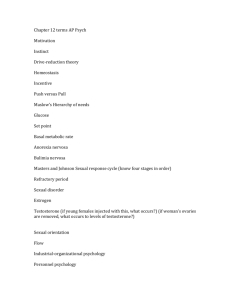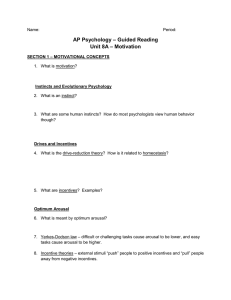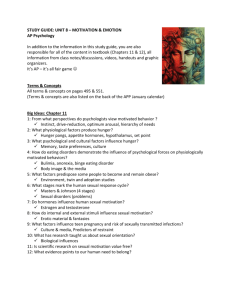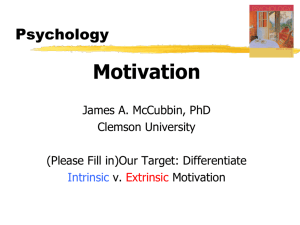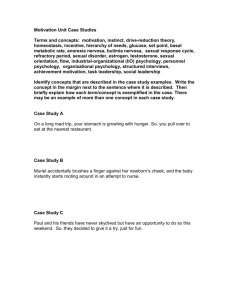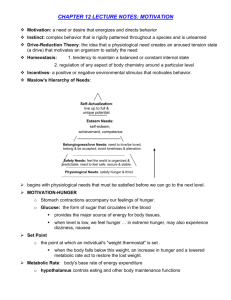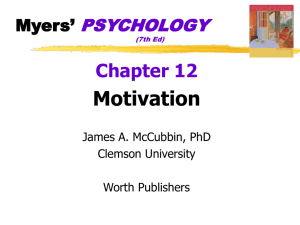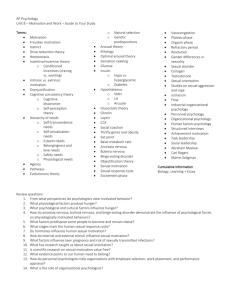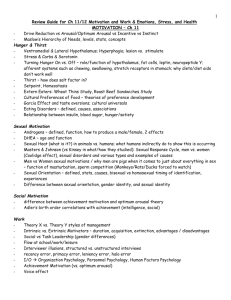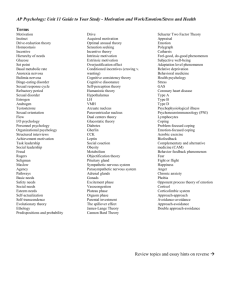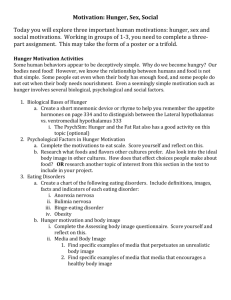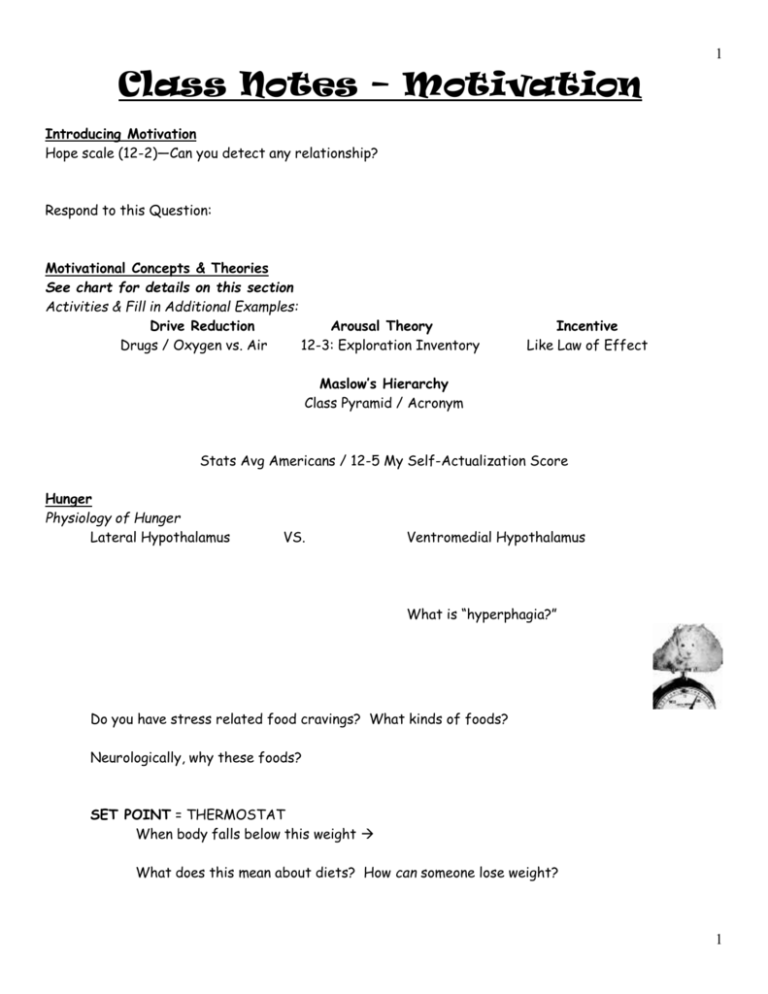
1
Class Notes – Motivation
Introducing Motivation
Hope scale (12-2)—Can you detect any relationship?
Respond to this Question:
Motivational Concepts & Theories
See chart for details on this section
Activities & Fill in Additional Examples:
Drive Reduction
Arousal Theory
Drugs / Oxygen vs. Air
12-3: Exploration Inventory
Incentive
Like Law of Effect
Maslow’s Hierarchy
Class Pyramid / Acronym
Stats Avg Americans / 12-5 My Self-Actualization Score
Hunger
Physiology of Hunger
Lateral Hypothalamus
VS.
Ventromedial Hypothalamus
What is “hyperphagia?”
Do you have stress related food cravings? What kinds of foods?
Neurologically, why these foods?
SET POINT = THERMOSTAT
When body falls below this weight
What does this mean about diets? How can someone lose weight?
1
2
Turning Hunger On
What brain part works like a sugar detector? What type of cells and 2 chemicals are important?
Describe the relationship between hunger/satiety and these chemicals.
Turning Hunger Off
Afferent inhibition systems: What are afferent systems and how do they shut off hunger?
Tricks for dieting?
Experiments with dogs show us what?
Thirst
What brain part? What level of body fluids? What does that mean? Why is sea water bad and
why is Gatorade good when thirsty?
Psychology of Hunger
Handout 12-6 Results
What is an external eater? Are you one? Describe.
How can the sight of a delicious steak cause someone to be hungry even if they weren’t
prior to seeing the steak?
More on Schachter’s “External Eaters”
1) Wheat Thins
2) Roast Beef Sandwiches
Genetic preferences:
Cultural-induced preferences: How might these be a careful calculation of rewards and costs?
Garcia Effect: Give a personal example
2
3
Eating Disorders
Anorexia Nervosa
Bulimia Nervosa
Obesity – How is it different than the A and B above?
Video – Eating Disorders
Sexual Motivation
Sexual Differences: Does it make you rethink your idea of what is “normal?”
Physiology and Psychology of Sex
What are androgens?
How do you become male/female?
What is a true hermaphrodite?
2 Effects of Sex Hormones:
1)
2)
Onset of sexuality caused by...
Physiological Drive caused by…
Why is there Sexual Heat in Animals, but not Humans?
Masters and Johnson: Sexual Response Cycle: EPOR –
Excitement:
Do old people’s physiological arousal decrease?
Plateau:
Orgasm:
Resolution:
How do men and women differ here?
3
4
Men vs. Women on Sexual Motivation
- more spontaneous thoughts about sex
- frequency / variety of sexual fantasies
- desired # of partners
- masturbation frequency
- liking for a variety of sexual practices
- making sacrifices for sex
BUT NOT orgasmic capacity & general enjoyment of sex
What about the following?
- Smiling
- Tendermindedness
- Trust
- Indirect Aggression—social rejection or ostracism of the target of aggression, such as in the
form of spreading nasty gossip about the target and displaced aggression such as slamming
doors
Sexual Disorders
Examples: Premature ejaculation, impotence, vaginismus
Causes:
Physical:
Psychological:
Interpersonal:
Sexual Orientation
Defined:
Cross-culturally,
It’s like handedness! most 1 way, but others are the other or both
Correlations:
- Correlation with Brain Structure:
- Genes: Twin Studies
- Prenatal Environment:
- Brain Activity:
- Fingerprint patterns:
4
5
Social Motivation
Achievement and Motivation
Paint a picture of someone who has “high achievement motivation.”
If you saw the Neal Fox presentation, he is one of these people. They set numerous goals
throughout life and constantly meet the challenges presented to them. They seek out difficult
situations and excel at them. They are “self-actualized” people (Maslow’s Hierarchy)
How is “achievement motivation” different than optimum arousal theory?
High achievement motivation can be thought of as a personality trait or a lifestyle. It describes
how some people seem to excel at everything they do. Optimum arousal isn’t concern with the
differences among people, but is instead focused on what level of arousal (sympathetic NS)
maximizes one’s performance on various tasks, depending on whether they are easy or difficult.
How can parents contribute or help develop a highly motivated individual?
Recall Erikson’s 2nd, 3rd, and 4th stages (Autonomy v. Shame/Doubt, Initiative v. Guilt, Industry v.
Inferiority). What these stages share is a child’s ever growing sense of accomplishment and selfworth. Just imagine if your parents, your siblings, and your teachers NEVER complimented you
when you rode a bike for the first time/tied your shoes for the first time, etc. Those with the
early childhood support, reward systems, and praise are more likely to develop into being a highly
motivated individual.
Birth Order
Who does better in school and on intelligence tests? WHY?
First borns are better in almost every measure of “success” we have, such as intelligence tests,
how much money they make, life satisfaction, etc.
Example: Astronauts, presidents overwhelmingly first borns
Alfred Adler:
o 1st Born:
o
Middle:
o
Youngest: Youngest children are best in social activities; they are the most popular
kids. Why? They have learned the skills of maneuvering through relationships
with siblings
Do you agree?
Intrinsic vs. Extrinsic Motivation
Why are you taking the AP Exam?
Probably extrinsic College Credit. But why are you taking the course? Hopefully,
maybe, just maybe it’s an intrinsic reason it’s interesting, it will help me to think critically, etc.
Internal
VS.
External
Pretty much same as above (internal comes from within meaning intrinsic motivation…)
5
6
Example: Lombardi: “Winning isn’t everything, it’s the only thing.”
Theories of Management
Theory X
VS.
Theory Y
Theory X managers believe that employees will only be motivated to do their job if they are
provided rewards and punishments. They are more inclined to think of workers as lazy.
Theory Y mangers believe that employees potential must be developed and that making
employees happy are what leads to the best result for the company overall. Therefore, they
manage employees’ internal states to a much higher degree. A good way to remember these guys
is to say, “Theory Y’s are nice guys.” I’d much rather work for a Theory Y manager than a
Theory X one.
Task vs Social Leadership
Think of a group you belong to at school / community. Think of the leader(s) of the group.
Are they more likely to say something like, “here’s the objective for the day. These things must
get done before we leave. Let’s get to work.” If so, that’s task leadership. If they are more
inclined to think we should try and include as many people in the process as possible and develop
the relationships within the group, they are likely a social leader. You probably need a little of
both in an effective organization.
Flow
When you’re “in the moment” and all of your cognitive energy is focused on the task at
hand, you may experience this state of mind called flow. I get it when playing any sort of sport.
Those who are actors probably experience this if they are able to entirely block out all distracters
external and internal (audience and other intrusive thoughts). Flow tends to make performance go
up.
If time… These 3 (2 + the 1 added) make up something called I/O Psychology
(Industrial/Organizational Psychology)
Organizational Psychology
See your book
Personnel Psychology
See your book
Also see your book for the 3rd time of I/O Psychology, Human Factors psychology
6

